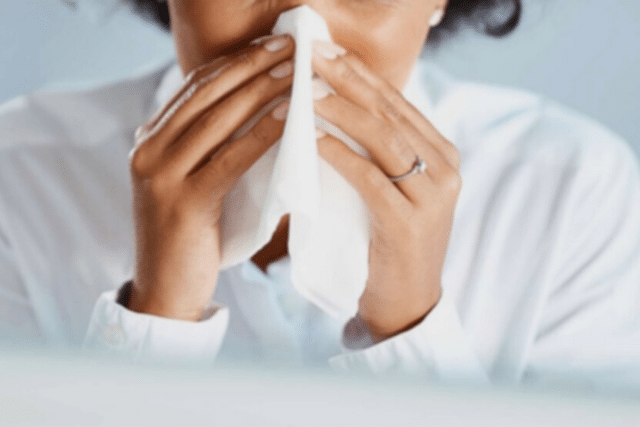Contents
Covid-19 and Seasonal Allergies are challenging to differentiate due to their similarities. The stress of the pandemic has people wondering if they should take a Benadryl or get a Covid test. Here we will explain the differences between the two. I hope to help you determine your next steps to stay safe while allergy season is among us during a pandemic.
Covid is a condition that affects the mucus membranes in your nose. It’s difficult to diagnose because it shares many symptoms with other conditions like seasonal allergies, sinusitis, and hay fever.
Click here Stay informed about COVID-19
Springtime in The Pandemic
Covid-19 has affected thousands of people every day, and with spring allergies coming up, we may be more aware. With 60 million Americans suffering from allergies this year, many pay attention to their symptoms as Covid affects the body similarly in some ways.
Some states are allowing places and businesses to open for small outdoor activities. If you are an allergy sufferer and wanting to get back to a sense of normalcy, springtime can be tricky, leading many of us to wander the isles of the local drug store in search of allergy relief.
Although we understand Covid-19 better than we did this time last year, it is still important to know what is Covid to help stop the spread of the virus. Headache, running nose, fatigue, and sore throat can raise concern because seasonal allergies and Covid-19 have these symptoms.
So, we must ask ourselves: “Are these my regular seasonal allergies, or are they signs of Covid-19?”
Differences of Covid-19 and Allergies
Seasonal allergy symptoms that DO NOT correspond with Covid-19 are:
- Sneezing
- Itchy or watery eyes
- Tickly cough
- Postnasal drip
- Productive cough (wet cough)
- Congestion.
Symptoms that DO correspond with Covid-19 are:
- A Sudden Loss of Taste and Smell
- Fever over 100.4 F,
- Gastrointestinal Problems (nausea, vomiting, or diarrhea.)
- Dry, Persistent Cough
Covid-19 symptoms
Loss of taste and smell, a high fever, a dry, persistent cough, and gastrointestinal problems are the main symptoms of Covid-19. If you have one or more of these symptoms, schedule a Covid screening immediately. You should also quarantine yourself for at least 14 days, per the CDC. Please remember to follow the recommended Covid-19 safety guidelines.
Covid-19 Prevention and Treatment
Public health orders and guidelines are the best way to stay safe. The CDC is your go-to for up-to-date Covid-19 information, so start with their website! For anything related to testing/screening locations or treatment options, contact your local provider too. Other ways to stay healthy and safe is to remember these tips:
- Wash your hands!
- practice Social Distancing (6ft or more, per the CDC)
- Avoid public Areas. (especially with a high crowd count)
- Do not gather in large crowds (check your state’s guidelines for social gathering requirements)
- Wear a face mask that covers your nose, mouth, and chin when going out.
- Sanitize high touch surface areas frequently.
For seasonal allergies, you can follow these tips:
- Dust your home frequently.
- Frequently clean or change the air vent filters in your home.
- Wash your clothes after being exposed to allergens.
- Purchase an air purifier for your home.
- Drink plenty of water
- If you have more intense allergies, avoid being outside for long periods at a time.
- Wash your face and hands after being outside or exposed to allergens.
- Take antihistamines (over-the-counter allergy medications) over-the-counter medications include:
- Zyrtec
- Flonase
- Benadryl
- and other antihistamines.
If these forms of treatment are not effective, you may need to visit an Allergy Specialist.
Are you looking for medical advisement for seasonal allergies? TrueCoverage might help! Click the link below to get started on your journey to a healthier you.
Read more about What can I do after I get vaccinated?
FAQ
Why are my allergy symptoms worse than usual?
Due to the pandemic, a lot of us were indoors more than usual. Low exposure to allergens can lead to more severe symptoms. Once your body’s natural defenses awaken, allergy symptoms should subside.
Can wearing a face mask lessen seasonal allergies?
Wearing face coverings not only stops the spread of Covid-19, but face coverings can also prevent allergens from entering your system. Face coverings will help lessen the effects of your seasonal allergies.
Read more on Do Medicare plans cover coronavirus tests and treatments?
References:
Image by Joseph Mucira from Pixabay
Seasonal Allergies vs. Coronavirus: Difference in Symptoms and Treatment (webmd.com)
Is it COVID-19 or seasonal allergies? | MIT Medical
Seasonal Allergies | Johns Hopkins Medicine
FastStats – Allergies and Hay Fever (cdc.gov)
who-china-joint-mission-on-covid-19-final-report.pdf
Is It COVID-19, a Cold or Seasonal Allergies? – Health Essentials from Cleveland Clinic
Seasonal Allergies vs. Coronavirus: Difference in Symptoms and Treatment (webmd.com)

